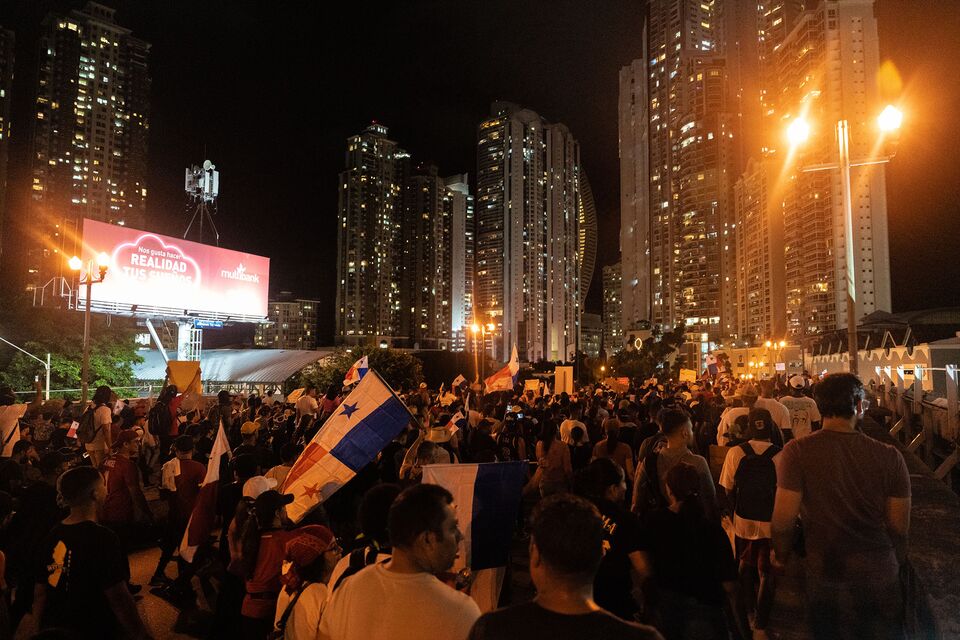
Panamanians protest against Canadian mega mining project. Photo: Walter Hurtado/Bloomberg.

Orinoco Tribune – News and opinion pieces about Venezuela and beyond
From Venezuela and made by Venezuelan Chavistas

Panamanians protest against Canadian mega mining project. Photo: Walter Hurtado/Bloomberg.
By Alejandra García – Oct 30, 2023
Panama has risen up once again. For several days now, Panamanians have taken to the streets against a nefarious mining contract that would not only put vast areas of the country in the hands of private companies headquartered in Canada, but would also cause irreparable environmental damage. The unpopular signing of the mining contract with Minera Panama, a subsidiary of First Quantum Minerals, has lit a popular uprising in the country and put the government of the Democratic Revolutionary Party in front of a new social crisis.
Just over a year ago, the Panamanian people were the protagonists of massive protests against President Laurentino Cortizo over the high cost of fuel and food. Today, the images and reports from the country that connects Central and South America are raising the possibility of a new popular movement with broad appeal.
This time, people are not demanding social aid. This time it is something much bigger: the repeal of a law that allows the exploitation and privatization of the largest copper mine in Central America.
The protests began in March, though much smaller in size, when the government announced that it had reached an agreement with the Canadian mining company. The document contains phrases such as “Expropriation of land,” “Restriction of airspace,” and “Extension of land concession,” which set off alarms among the people, especially environmental activists and the communities of Donoso and Omar Torrijos, where the mining activity is taking place.
Social anger exploded on October 27 after President Cortizo signed the document and authorized its implementation in the official registry despite widespread popular rejection.
Panama: Police Brutality Increases as Public Protests Exploitative Mining Contract With Canada
In the capital Panama City, protesters have marched day after day along the country’s main avenues to the National Assembly and the Presidential Palace with slogans such as “our homeland is not for sale,” and on more than one occasion have been met with tear gas from police forces.

According to Environmental Advocacy Centre director Lilian González, the alleged millions of dollars in income that the Panamanian state would receive from mining activities—$375 million annually—are “not guaranteed” due to the multiple legal loopholes included in the contract, and is not comparable to the price of environmental damage that the project could incur.
“We don’t even have a guaranteed income that can cope with the damage it causes including the loss of watersheds, rivers, and forests, which are our most precious environmental assets,” González said, adding, “historically, the country has been able to develop economically without depending on mineral extraction.”
In what can only be described as a victory, Cortizo was forced to pull back and announce a referendum to determine the future of the mining contract or “Law 406,” which will take place on December 17. Meanwhile more pressure is coming from Panama’s Supreme Court which will consider a lawsuit alleging that the government’s contract with First Quantum violates the constitution.
The people’s skepticism and distrust of Cortizo prevail because of the way he slid the deal through the back door in the middle of the night. The signing of the law was one of the quickest actions his government has done. Law 406 was published in the Official Gazette after 7 pm on October 27, the same day it was signed by the president.
González concluded, “Panama is in a moment of commotion and uncertainty over the future of its environmental reserves. The turmoil in the country will continue due to the few guarantees offered by the government, but we will make it clear to everyone that our homeland is not for sale.”
(Resumen Latinoamericano – English)